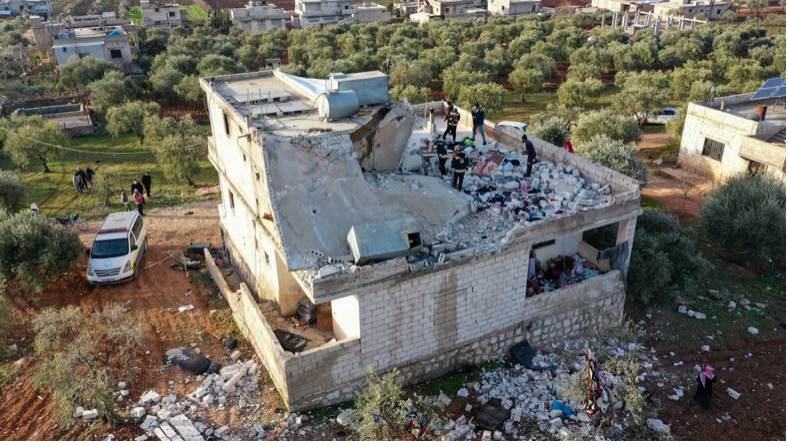CommentsMILITARY ACTION - President Biden announced Thursday that the U.S. military has "successfully removed a major terrorist threat to the world," ISIS leader Abu Ibrahim al-Hashimi al-Qurayshi.
Why it matters: Al-Qurayshi, who took over as the leader of ISIS after Abu Bakr al-Baghdadi was killed in a 2019 U.S. raid, coordinated the group's global terror operations and directly oversaw ISIS attempts to reconstitute in Iraq and Syria, according to senior U.S. officials.
- Al-Qurayshi was "the driving force behind the genocide of the Yazidi religious minority in northwestern Iraq in 2014 and the enslavement of thousands of young Yazidi girls, using rape as a weapon of war," one official said.
- ISIS-K, the Afghanistan affiliate that killed 13 U.S. service members and 170 Afghan civilians in a bombing at Kabul's airport in August, recognized al-Qurayshi as its overall leader.
What he's saying: "You all remember the gut-wrenching stories of the mass slaughters that wiped out entire villages. Thousands of women and young girls sold into slavery. Rape as a weapon of war. Thanks to our troops, this horrible terrorist leader is no more," Biden said in brief remarks on Thursday.
- "This operation is a testament to America's reach and capability to take out terrorist threats no matter where they try to hide anywhere in the world," the president added. "I'm determined to protect the American people from terrorist threats, and I'll take decisive action to protect this country."
- "We'll continue working with our close allies and partners, the Syrian Democratic Forces, Iraqi Security Forces, including the Peshmerga and more than 80 members of the global coalition to keep pressure on ISIS to protect our homeland. We remain vigilant. We remain prepared."
Driving the news: About two dozen U.S. special forces carried out an aerial raid overnight in a Syrian town close to the border with Turkey, in an operation that lasted over two hours.
- In order to protect civilians living on the first floor of the three-story house, U.S. forces announced their presence and asked everyone inside to evacuate, according to U.S. officials who briefed reporters on the condition of anonymity.
- Eight children were successfully removed from the site before al-Qurayshi detonated an explosive on the top floor, killing himself and his family in a blast "so large that it blew bodies outside of the house and into surrounding areas," one official said."
An unnamed ISIS lieutenant and his wife barricaded themselves on the second floor of the building and were killed in a firefight with U.S. forces.
- Officials would not say how many civilians were killed in the course of the operation but insisted that all casualties were the result of actions by al-Qurayshi and his associate.
- Early in the operation, one of the U.S. helicopters experienced mechanical issues and was forced to land several kilometers from the site, where the decision was made to disable and destroy it.
Behind the scenes: In early December, President Biden's top national security officials briefed him with a detailed tabletop model of the site where U.S. intelligence indicated that al-Qurayshi was living with his family.
- A U.S. official described the operation as "extraordinarily complex" due to the presence of civilian families living in the building, as well as the fact that al-Qurayshi ran ISIS through couriers without ever leaving his home.
- Biden gave his final approval for the raid on Tuesday morning and monitored the operation from the Situation Room with Vice President Harris, Defense Secretary Lloyd Austin, Joint Chiefs Chairman Gen. Mark Milley and other top national security officials.
The big picture: Officials believe that the elimination of al-Qurayshi, whom they described as one of the group's few remaining "legacy leaders," will be a major blow to ISIS due to his involvement in operational planning.
- Al-Qurayshi directly oversaw the massive Jan. 20 attack on a prison in northeast Syria holding thousands of ISIS fighters, which triggered a 10-day battle with U.S.-allied forces that left hundreds of militants dead, officials said.
- ISIS' physical caliphate in Iraq and Syria has been significantly degraded since 2017, but the terrorist group has continued to expand with branches and networks in over three dozen countries.
(Zachary Basu is a national security reporter at Axios. Oriana Gonzalezis a breaking news reporter on the Axio Newsdesk.)







